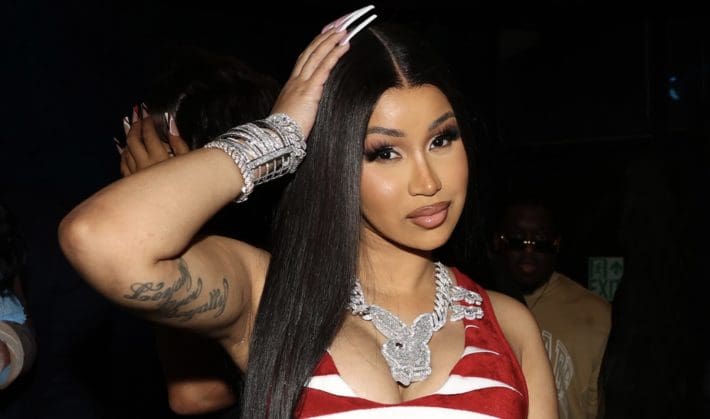Judge Upholds Cardi B’s Victory at Back Tattoo Trial, Orders Plaintiff to Pay Her Legal Fees
Cardi B won a decisive victory this week in the case against her over the cover of her first mixtape, Gangsta Bitch Music, Vol. 1. via: Rolling Stone U.S. District Judge Cormac J. Carney ruled Wednesday that plaintiff Kevin Brophy’s request to overturn the Oct. 21 jury verdict was both too late and lacked merit. The post Judge Upholds Cardi B’s Victory at Back Tattoo Trial, Orders Plaintiff to Pay Her Legal Fees appeared first on LOVEBSCOTT.


Cardi B won a decisive victory this week in the case against her over the cover of her first mixtape, Gangsta Bitch Music, Vol. 1.
via: Rolling Stone
U.S. District Judge Cormac J. Carney ruled Wednesday that plaintiff Kevin Brophy’s request to overturn the Oct. 21 jury verdict was both too late and lacked merit. He subsequently ordered Brophy to pay the Grammy-winning “WAP” rapper’s attorney’s fees and costs.
Brophy, the man who sued for $5 million with claims his back tattoo was misappropriated, had asked the court to toss the verdict based on the losing argument that the jury simply got the law wrong and it was up to the trial court to correct the error.
Judge Carney wrote in his ruling that it was Brophy and his lawyers who erred when they failed to preserve their right to bring such a request — known as a Rule 50 motion — before the case was submitted to the jury for deliberations.
“The untimeliness of Brophy’s Rule 50 is reason enough to deny it. But the motion also wants for substantive merit,” Carney wrote in his ruling obtained by Rolling Stone.
The judge said the jurors heard competing evidence on a variety of issues and “reasons abound to sustain the jury’s verdict of not liable on all claims.” He ruled that the image at the center of the lawsuit — where Cardi B is seen in the back of a limousine, staring into the camera, taking a swig from a Corona, and holding the back of man’s head as he appears to perform oral sex on her — involves a non-white male model who posed for the original photo and whose own back tattoo was covered up with a portion of Brophy’s elaborate tiger and serpent tattoo ripped from the internet.
The judge pointed out that both Brophy and Cardi B’s former manager testified at trial that “the model appears non-white with black hair while Brophy is white and has a shaved head.”
“The jury had an ample basis for its verdict. For example, the jury could have reasonably concluded that the back tattoo on the model on the mixtape cover at issue in this suit was not sufficiently identifiable with Brophy to constitute misappropriation of his likeness or depiction in a false light. Because the model’s face is not visible, identification based on facial appearance is impossible,” Judge Carney wrote.
Even more compelling, he wrote, was the small part the tattoo played in the overall composition of the cover art.
“Most importantly, Brophy’s tattoo played a minor role in what was a larger visual commentary on sexual politics. Brophy’s tattoo was but one tattoo on the back of the model, who was himself but one part of a suggestive portrayal of a man with his head between Cardi B’s legs while she was in the backseat of a vehicle and drank an alcoholic beverage,” the judge wrote.
“The purpose, Cardi B testified, was to show her in control, reversing traditional gender roles,” he continued. “It is hard to see how the cover’s economic value derived at all from Brophy’s tattoo. Despite any contrary evidence that Brophy presented, the jury was within reason to find that the use of the tattoo was transformative.”
Lawyers for Cardi B and Brophy did not immediately respond to requests for comment from Rolling Stone.
In her court filings leading up to the trial, Cardi B claimed the artist who photoshopped a portion of Brophy’s tattoo onto the cover of Gangsta Bitch Music Vol. 1 did so without her knowledge. She also pointed out that her cover art did not include Brophy’s distinctive “Born to Lose” neck tattoo.
“That’s a Black man with hair, and this is a white man with a shaven head,” Cardi’s lawyer Peter J. Anderson said as he compared Brophy to the cover art model in his opening statement at the four-day trial.
Anderson further argued the tattoo imagery photoshopped onto the mixtape cover was altered and manipulated to such a degree that it became a “newly created piece of art” protected by the First Amendment.
During the trial, Brophy testified that between the time he first saw the mixtape cover until the time he filed the lawsuit, no one other than his tattoo artist approached him to inquire about the presence of his tattoo on the Cardi cover.
Cardi, born Belcalis Almánzar, attended the California trial in person with Lisa Fortune Moore, the lawyer who helped secure her $4 million win against blogger Tasha K. in Atlanta.
The post Judge Upholds Cardi B’s Victory at Back Tattoo Trial, Orders Plaintiff to Pay Her Legal Fees appeared first on LOVEBSCOTT.












